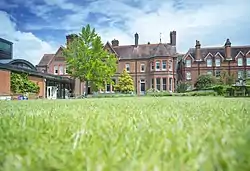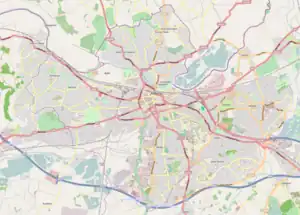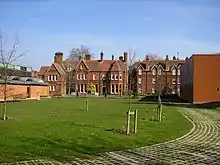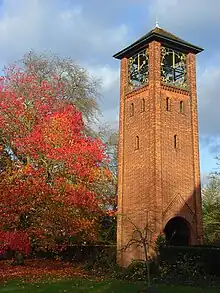 The Museum of English Rural Life | |
 Location within Reading | |
| Established | 1951 |
|---|---|
| Location | Reading, Berkshire, England |
| Coordinates | 51°26′55″N 0°57′40″W / 51.44868°N 0.96098°W |
| Type | Agricultural museum |
| Accreditation | Arts Council England National Archives |
| Website | merl |
The Museum of English Rural Life, also known as The MERL, is a museum, library and archive dedicated to recording the changing face of farming and the countryside in England. The museum is run by the University of Reading, and is situated in Redlands Road to the rear of the institution's London Road Campus near to the centre of Reading in southern England. The location was formerly known as East Thorpe House and then St Andrew's Hall. It is an accredited museum and accredited archive as recognised by Arts Council England and the National Archives.[1][2][3][4][5]
History
The museum's site was originally occupied by a house known as East Thorpe, designed in 1880 by Alfred Waterhouse for Alfred Palmer (of the Reading biscuit manufacturers Huntley & Palmers). Palmer was an important early benefactor of Reading University and in 1911 East Thorpe was extended to become St Andrew's Hall, a hall of residence for women attending the university.[6]
The museum itself was founded in 1951, growing out of the university's long academic connections with agriculture. The founding objects of the museum came from the collections of H. J. Massingham and Lavinia Smith. It originally occupied premises on the University of Reading's main Whiteknights Campus,[3] opening to the public in 1955. St Andrew's Hall closed as a hall of residence in 2001. The site was then redeveloped for the use of the museum, with the cost of £11m being shared by the university, the Heritage Lottery Fund and public donations. The redeveloped museum opened in 2005 and retains the original East Thorpe building, with the addition of an adjoining new building. The two contrasting buildings overlook restored gardens, providing a setting for a rural collection in an urban environment.[1][3][6]
The Museum underwent a period of further redevelopment from 2013–2016, funded by the Heritage Lottery Fund, the Wellcome Trust, and the University of Reading.[7] The Museum officially reopened on 22 October 2016 with ten new galleries, including a gallery dedicated to Ladybird Books artwork held by the University of Reading Special Collections.[8]
In February 2019, a bat was found on the museum's premises. The museum named the bat MERLin and issued him a library card.[9][10] To mark their 70th year, the museum worked with artists and writers from different communities on 51 Voices,[11] enabling responses to objects connected to 1951 in the collections.
Collections
The Museum houses designated collections of national importance that span the full range of objects, archives, photographs, film and books. It is also the location of the University of Reading's special collections archive, housing hundreds of collections of rare books, manuscripts, typescripts and other objects of importance. The collections hold over 25,000 objects, almost all of which are on display, and which provide a material record of rural England covering 1750 to the present day. It cares for a collection of livestock portraiture, representations of rural life, agricultural hand tools, ploughs, farm machinery, sewing machines and other equipment.[1][2][12][13][14][15][16][17][18]
The museum has a specialist library and houses other collections including the library of the Tools & Trades History Society.[19]
Gallery
.jpg.webp) Entrance to the Museum
Entrance to the Museum The Welcome Case
The Welcome Case Detail of the Making Rural England Gallery
Detail of the Making Rural England Gallery A Year on the Farm Gallery
A Year on the Farm Gallery The rear garden, with the original East Thorpe House in the centre
The rear garden, with the original East Thorpe House in the centre
References
- 1 2 3 "Doors set to open on rural museum". BBC. 30 June 2005. Retrieved 25 April 2009.
- 1 2 "About the Museum of English Rural Life". University of Reading. Retrieved 24 April 2009.
- 1 2 3 "Our History – Museum of English Rural Life". University of Reading. Retrieved 24 April 2009.
- ↑ "List of Accredited museums in the UK, Channel Islands, and Isle of Man". Arts Council England. Retrieved 12 February 2018.
- ↑ "Accredited archive services, statistics and outcomes". The National Archives. Retrieved 12 February 2018.
- 1 2 "The History of St. Andrew's Hall – a scrapbook" (PDF). University of Reading. Retrieved 24 April 2009.
- ↑ "Museum of English Rural Life opens after multi-million pound redevelopment". Heritage Lottery Fund. Retrieved 12 February 2018.
- ↑ "Entire art gallery of Ladybird book covers is world first". The Guardian. Retrieved 12 February 2018.
- ↑ "UK Museum Finds Cute Bat in Its Rare Book Store, Names It 'Merlin'". Geek.com. Archived from the original on 26 February 2019. Retrieved 26 February 2019.
- ↑ "How an unlikely English museum became a viral sensation". Telegraph.co.uk. Retrieved 26 February 2019.
- ↑ "51 Voices". The MERL. Retrieved 9 January 2024.
- ↑ "University of Reading, Museum of English Rural Life". MICHAEL – The Multilingual Inventory of Cultural Heritage in Europe. Archived from the original on 27 July 2011. Retrieved 24 April 2009.
- ↑ "Collection Overview". The Museum of English Rural Life. Retrieved 12 February 2018.
- ↑ "Museums with basketry collections". The Basketmakers' Association. Retrieved 12 February 2018.
- ↑ "Art UK". Art UK. Retrieved 12 February 2018.
- ↑ Wilson, Catherine (2011). Digging deep : report on the results of the Plough Survey. Rural Museums Network. p. 22.
- ↑ "Barnett, James Nutcombe (sewing machine collector)". Barnett (sewing machine collector). The Museum of English Rural Life. Retrieved 9 December 2019.
- ↑ "Michael O'Connell Wall Hanging object record". The Museum of English Rural Life online catalogue. Retrieved 12 February 2018.
- ↑ Tools & Trades History Society
